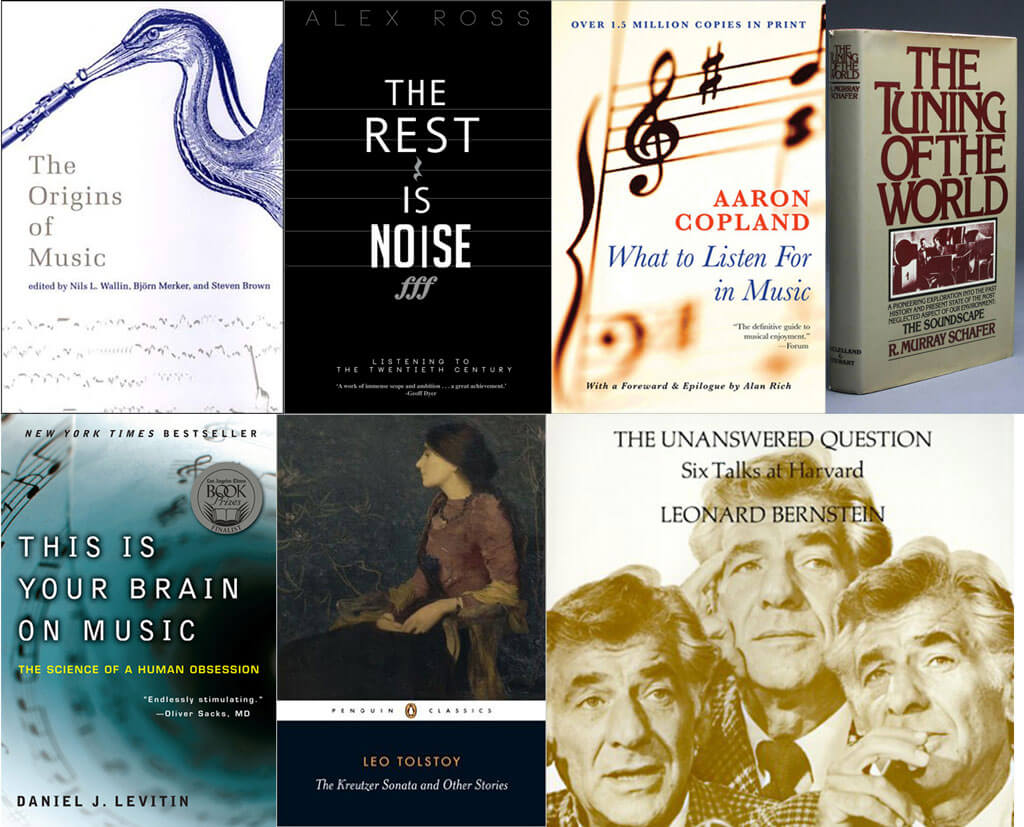
1: The Origins of Music Edited by Nils L. Wallin, Christina Wallin, Björn Merker and Steven Brown [MIT Press 1999]
Though The Origins of Music has mostly run under the radar since it was first published in 1999, it contains a treasure trove of insights. The grand question centres on what biological and cognitive forces have caused humankind to be musical creatures. Perspectives include contributions from leading musicologists, biologists, anthropologists, archaeologists, psychologists, neuroscientists, ethologists, and linguists who each contributes a piece to the puzzle of the origins of music.
2: The Unanswered Question: Six Talks at Harvard by Leonard Bernstein [OUP 1976]
I first came across this book in high school, and it was the first time that I learned about the theory that music could be thought of as a language. It is controversial material, but Bernstein makes a convincing argument delivered with passion and chutzpah. Unfortunately, the book is difficult to find, but thanks to the magic of the internet, the accompanying video series are freely available on YouTube.
3: The Rest is Noise by Alex Ross [4th Estate 2007]
Written by the New Yorker Magazine classical music critic Alex Ross, The Rest Is Noise has become a textbook for the new world. Ross articulates the hilly terrain of 20th-century classical music in a passionate voice that is both readable and compelling. He also includes a miraculous amount of detail surrounding the musical history of the past 100 years, and grounds each facet into bit size pieces that are easy to grasp.
4: This is Your Brain on Music by Daniel Levitin [Atlantic Books 2007]
Daniel Levitin, himself a fascinating example of a pop music record executive turned neuroscientist, provides an examination of what happens to us when we listen to music. It offers a glimpse behind the curtain of how the brain experiences music and points towards an alternative to the prevailing linguistic basis for music. An amazing read.
5: What to Listen for in Music by Aaron Copland [Signet Classic Revised Edition 1932]
Aaron Copland presents his classic guide on how to hear music through fully engaged, active ears. The goal is to reveal a whole new world of sound that is just waiting to be discovered — if you know what to listen for it.
6. The Tuning of the World by R. Murray Schafer [Random House, 1977]
Schafer’s The Tuning of the World is a vital resource for anyone interested in the importance the sound around us. It outlines the importance of sound as a fundamental feature of our natural and urban environments, and argues for preserving the earth’s “acoustic design.” Schafer elegantly points the way forward.
Bonus (Fiction) The Kreutzer Sonata by Leo Tolstoy
While this list is focused mainly on non-fiction books, Tolstoy’s The Kreutzer Sonata is just too good not to mention. Tolstoy, inspired by Beethoven’s music, communicates music’s ability to incite the most powerful emotions of love and hate. ‘Music makes me forget myself, my true condition, it carries me off into another state of being, one that isn’t my own,’ says the protagonist, Pozdnyshev. The novella also inspired Leoš Janáček’s First String Quartet.
#LUDWIGVAN
Want more updates on Toronto-centric classical music news and review before anyone else finds out? Get our exclusive newsletter here and follow us on Facebook for all the latest.
- THE SCOOP | Royal Conservatory’s Dr. Peter Simon Awarded The Order Of Ontario - January 2, 2024
- THE SCOOP | Order of Canada Appointees Announced, Including Big Names From The Arts - December 29, 2023
- Ludwig Van Is Being Acquired By ZoomerMedia - June 12, 2023



